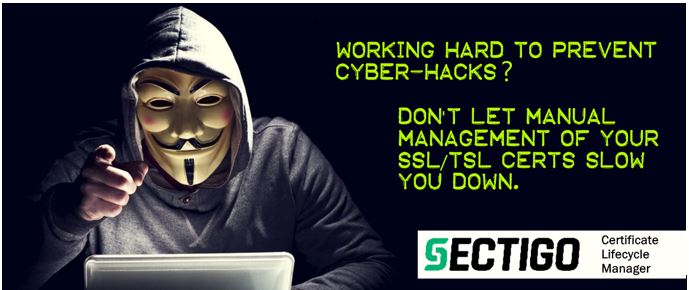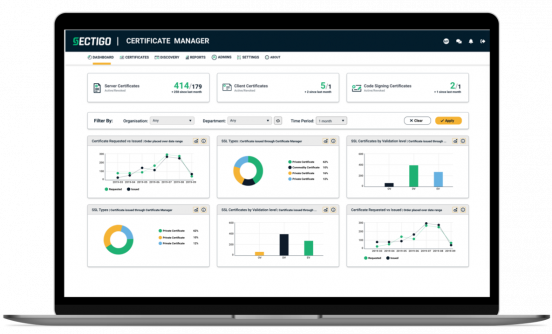
The need to protect data from increasing cyberattacks is more important than ever before. The crisis in Ukraine has peeked awareness to the number of threats that are ongoing and how those attacks can put a business, hospital, school even a government’s operations at a complete standstill.
One of the most important ways to increase your cybersecurity is to use digital certificates, which provide many benefits by allowing entities to share their public keys in an authenticated manner.
- Digital certificates help ensure your message reaches its intended recipients.
- Digital certificates help us understand that an email or a website could be fake.
- Investing in cybersecurity lets your customers know that you value their privacy and security above all else, and you build a positive reputation.
Mismanagement of SSL/TLS certificates leads to application issues and security threats. In many organizations, it is unclear who is responsible for monitoring these certs. Often these are managed manually via an excel spreadsheet…but what happens if the person responsible leaves, or that spreadsheet is accidentally deleted?
That is why AUTOMATED CERTIFICATE LIFECYCLE MANAGEMENT is so important!
On 1 September 2020, new, shorter lifetimes were introduced for SSL/TLS certificates which are now valid for a maximum term of 13 months. Browser manufacturers expect this change to bring greater security. For website operators, however, shorter lifetimes mean more work, especially if their management process is a manual one. Some of the shortfalls are:
- The expiration time of the certificates is unknown, and no visual dashboard is available.
- They cannot keep track of the increasing number of digital certificates and their cost.
- The financial damage they suffer as a result of unplanned interruptions is on a large scale.
- Difficult to determine the number of keys and certificates enterprise-wide.
- Most organizations aren’t sure how capable they are of securing keys and certificates. In other words, they do not know if the certificate they use is at the expected security level.
- They are concerned about having and retaining IT staff who will be involved in qualified and certificate management.

A more secure solution would include Sectigo’s Certificate Manager which can give your team a central repository and dashboard to manage and track all digital certificates across your entire enterprise. By installing the SCM solution it will become a major part of your IT management infrastructure, allowing you to update, add and delete one to thousands of digital certificates via a streamlined dashboard and email alert system.
Sectigo Certificate Manager (SCM) is a universal platform purpose-built to issue and manage the lifecycles of public and private digital certificates to secure every human and machine identity across the enterprise, all from a single platform. With SCM, customers can automate the issuance and management of Sectigo certificates, alongside their certificates from other publicly trusted Certificate Authorities (CAs) and existing private CAs, like Microsoft CA.
Sectigo Certificate Manager seamlessly deploys and automates lifecycle management of PKI certificates across all the following use cases:
- Secure Web Servers and Load Balancers
- Enterprise email security with Signing and Encryption
- Secure Networked and Mobile Devices
- Digital Identity Management for Zero Trust
- Secure DevOps Containers and Code
- Secure Application Development
- Key Management in Public Cloud
Do you want to learn more about Sectigo Certificate Management and hear how our system could benefit your enterprise? Reach out today to set up an informative webinar, to be able to utilize our no-cost discovery tool or even implement a free POC to see the system in action.





